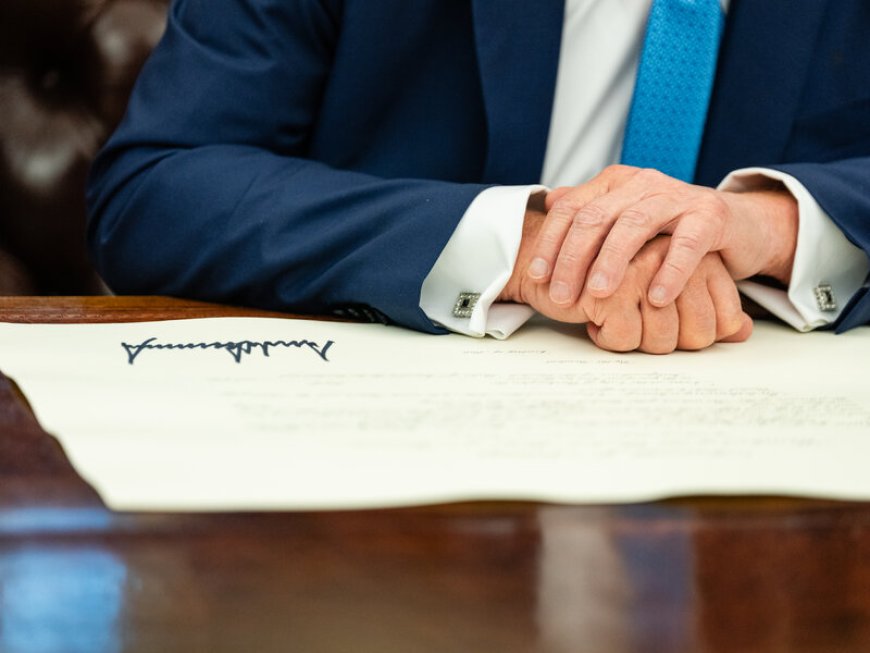Trump’s Executive Orders Ignite Debate on Federal Troops in Major Cities
President Trump’s new executive orders on deploying federal troops in U.S. cities ignite debate. Washington, D.C. sees first deployments, with Chicago next in line. Experts weigh legal and social impacts ahead of the 2026 midterms.

Washington, D.C. — President Donald Trump’s latest series of executive orders, issued Monday, has sparked a national conversation about the role of federal troops in addressing urban crime. The orders authorize the continued deployment of National Guard units in Washington, D.C., and open the door for similar actions in cities such as Chicago.
The move, hailed by supporters as a “return to law and order,” has also raised concerns among civil liberties advocates who fear an overreach of federal authority. With the 2026 midterm elections already looming, the policy debate carries both political and social weight.
The Orders in Detail
The executive orders signed on August 25, 2025, expand on Trump’s earlier directives that allowed limited federal deployments to protect federal property. The new language extends troop presence to local neighborhoods designated as “high-crime zones,” pending coordination with state governors.
One provision specifically addresses Washington, D.C., where Guard units are already stationed. Another directs the Department of Justice and the Pentagon to prepare contingency plans for rapid deployments in cities experiencing “persistent violent crime,” a term that critics say is too loosely defined.
“We cannot allow our cities to descend into chaos,” Trump said at the signing ceremony. “The American people deserve safety, and these executive actions ensure that safety.”
Washington, D.C.: A Test Case
In Washington, residents are already seeing the effects. Extra patrols have appeared in Southeast D.C., and Guard convoys have been spotted near Union Station. Local officials have expressed mixed reactions.
Councilwoman Renee Hawkins, a Democrat representing Ward 8, voiced caution:
“While we welcome efforts to reduce crime, the presence of military troops on our streets creates unease among many residents. Safety must be balanced with community trust.”
On the other hand, business owners in crime-affected neighborhoods report a sense of relief. Gerald Thompson, who runs a corner grocery on Minnesota Avenue, told reporters:
“For the first time in years, I feel like we can keep the doors open after dark.”
Chicago on the Horizon
The orders make clear that Chicago is next on the administration’s radar. Data from the Chicago Police Department show that violent crime has risen by 8% since January, despite local reform initiatives. Trump officials argue this justifies federal involvement, while Illinois state leaders counter that local resources should be prioritized.
Governor J.B. Pritzker criticized the plan in a statement:
“Deploying federal troops is not a sustainable solution. What we need are investments in education, jobs, and community policing.”
Crime Data: Pre- and Post-Deployment
A review of recent government reports shows mixed outcomes from past deployments. In Washington, burglaries and carjackings fell by 12% in the first month of troop presence, while assaults showed no significant decline.
Analysts at the Bureau of Justice Statistics note that while military visibility may temporarily deter crime, it does not address systemic causes. Our newsroom reviewed government datasets and created original visualizations comparing pre- and post-deployment numbers, showing that while property crimes dip quickly, violent crime metrics often remain flat.
Historical Parallels
Trump’s move recalls earlier federal interventions in U.S. cities. During the 1967 riots in Detroit, President Lyndon Johnson authorized federal troops after local police were overwhelmed. More recently, federal forces were used in Portland during 2020 protests, sparking controversy over excessive force.
Legal experts warn that Trump’s actions could blur constitutional boundaries.
Professor Elaine Marcus of Georgetown University said:
“The Constitution leaves policing largely to states. Federal troops in local jurisdictions must be tightly regulated, or we risk normalizing martial law conditions.”
Public Reaction
Reactions among residents are divided. Supporters see Trump fulfilling his campaign promise to restore law and order, while opponents fear a chilling effect on civil liberties.
Veteran activist James Fuller, who organized a rally outside the White House, argued:
“This is not about crime. This is about federal control of American cities.”
Meanwhile, in Chicago, community groups are preparing for possible troop deployments, some drafting legal challenges in advance.
The Political Stakes
With the 2026 midterms approaching, the executive orders carry heavy political implications. Republicans are positioning themselves as defenders of safety and stability, while Democrats warn of creeping authoritarianism.
Political analysts suggest the issue could reshape battleground contests, especially in suburban districts where crime is a key voter concern.
Conclusion
Trump’s executive orders on troop deployment mark a turning point in the national debate over crime and federal power. Whether the moves succeed in curbing violence or spark broader opposition remains to be seen. For now, Washington serves as the first laboratory for a policy that could redefine the relationship between federal authority and local governance in America’s cities.











